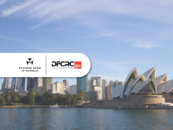The cryptocurrency and initial coin offering (ICO) craze has put pressure on regulators around the world as the number of scams and cases of fraud keeps on growing in the space.
Countries in Asia have had varied stands on cryptocurrencies with nations like China and South Korea emerging amongst the most rigid jurisdictions, while countries such as Singapore and Japan have opted for a more laissez-faire approach.

Image: People’s bank of China by Gang Liu via Shutterstock.com
China has been taking ever-increasing steps to curb cryptocurrencies trading and has been amongst the most stringent regulators regarding cryptocurrencies.
This started off by banning ICOs in September 2017, followed by ordering a bank account freeze associated with exchange platforms, kicking out bitcoin miners in January 2018, and most recently, instituting a nationwide ban on Internet and mobile access to cryptocurrency trading, blocking domestic and foreign services to “prevent financial risk.”
South Korea too banned ICOs as well as margin trading of cryptocurrencies in September 2017. Regulators cited the unprecedented number of fraud in the ICO sector.
Contrary to mainland China, Hong Kong’s Securities and Futures Commission (SFC) has confided itself to publishing a set of rules for companies looking to launch an ICO.
Japan, on the other hand, has been considered as one of the most permissive jurisdictions regarding cryptocurrencies. In April 2017, new legislation authorizing cryptocurrency as a legal payment method came into force.
Today, Japan is the second largest market for bitcoin trading, accounting for 37% of the world’s bitcoin trading volume, according to data from Cryptocompare.
But the recent hack of Japanese cryptocurrency exchange Coincheck has prompted backlash from the community and closer oversight from the Financial Services Agency (FSA).
The FSA has previously released risk warnings for ICO-related investments, noting that “the price of a token may decline or become worthless suddenly” and warning that the high “potential for fraud” in the space.
The FSA has also emphasized that some ICOs “may fall within the scope of the Payment Services Act and/or the Financial Instruments and Exchange Act depending on how they are structured.”
Nearby, in Taiwan, the Financial Supervisory Commission chairman Wellington Koo said in October 2017 that the government intended to support the development and adoption of ICOs and acknowledge blockchain technology and cryptocurrencies as lawful.
Koo stated that the Taiwan government was not planning to ban crypto-related activities and further promised a government comprehensive support.
In Southeast Asia, regulators have taken various approaches. Indonesia, the region’s largest economy, issued a regulation in December 2017 banning use of cryptocurrency by fintech companies involved in payment systems. Bank of Indonesia said it is examining whether there’s a need to regulate trading on digital currency exchanges.
A statement by the central bank issued in January 2018 advised citizens to not sell, buy or trade cryptocurrency because of “bubble risks” and susceptibility to be used for “money laundering and terrorist financing.”
Indonesian cryptocurrency exchanges BitBayar and TokoBitcoin closed following the announcement.

Image: The Monetary Authority of Singapore office
Meanwhile, Singapore has emerged as a hub for ICOs, thanks to its convenient taxation rules and supportive government stand towards fintech. The city-state’s central bank and financial regulator the Monetary Authority of Singapore issued a set of guidelines for token sales in November 2017, noting that the regulator “does not regulate virtual currencies; in fact, we welcome them as an innovation that can potentially reduce the cost of financial transactions. But we regulate the activities that surround virtual currencies if these activities pose specific risks.”
In Malaysia, the Securities Commission issued a press release in September 2017, warning investors “to be mindful of the potential risks involved in ICO schemes.”
“As the terms and features of ICO schemes may differ in each case, investors who wish to engage or invest in ICO schemes are reminded to seek legal or other professional advice if there are doubts on the legitimacy of these schemes,” the statement concluded.
In Thailand, the Securities and Exchange Commission shared its views on ICOs in September 2017, citing concerns that “in some cases, ICO may be deliberately used as a tool for fraud and scam.”
Most recently, the Philippines has confirmed upcoming cryptocurrency and ICO regulations to reduce fraud risks and protect investors.
In quotes reported by Reuters, Emilio Aquino, the commissioner in charge of enforcement and investor protection for the Philippines’ Securities and Exchange Commission, said:
“We need to act because ICOs are sprouting especially in 2017. We want to come up with our own set of regulations. You have to be extra careful how investors in this new space are protected.”
Featured image via Max Pixel.






